Ap Psych: Social Psychology Test Questions – Flashcards
Unlock all answers in this set
Unlock answersquestion
social psychology
answer
def: the scientific study of how we think about, influence, and relate to one another ex: B=f(P,E) B= behavior P= person E= environment f= the function of
question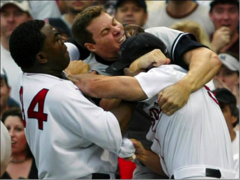
attribution theory

answer
def: the theory that we explain someone's behavior by crediting either the situation or the person's disposition ex: they are homeless because they are lazy and a drug addict
question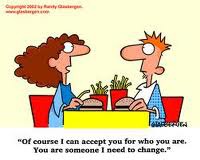
fundamental attribution error

answer
def: the tendency for observers, when analyzing another's behavior, to underestimate the impact of the situation and to overestimate the impact of personal disposition ex: they are speeding because they are a jerk (don't know that they are driving to the hospital)
question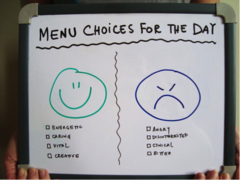
attitude

answer
def: feelings, often influenced by our beliefs, that predispose us to respond in a particular way to objects, people, and events ex: see a person in a shirt for a rival sports team and automatically do not like them
question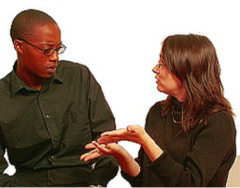
central route persuasion

answer
def: attitude change path in which interested people focus on the arguments and respond with favorable thoughts ex: TV ad that uses laboratory evidence to demonstrate the effectiveness of an acne treatment
question
peripheral route persuasion

answer
def: attitude change path in which people are influenced by incidental cues, such as a speaker's attractiveness ex: determine the best candidate by how well he is dresses
question
foot-in-the-door phenomenon

answer
def: the tendency for people who have first agreed to a small request to comply later with a larger request ex: get you to volunteer for one hour at a charity, then get you to volunteer several hours a week
question
role

answer
def: a set of expectations (norms) about a social position, defining how those in the position ought to behave ex: women role- cook, care for children, etc.
question
cognitive dissonance theory

answer
def: the theory that we act to reduce the discomfort (dissonance) we feel when two of our thoughts (cognitions) are inconsistent ex: a pacifist punches someone, feels discomfort, and rethinks their beliefs to apply only to certain situations
question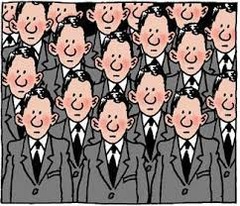
conformity

answer
def: adjusting one's behavior or thinking to coincide with a group standard ex: wear clothes that are "popular"
question
chameleon effect

answer
def: unconscious mimicry of the postures, mannerisms, facial expressions, and other behaviors of one's interaction partners NOT IN PLOTNIK ex: person crosses their arms, so you cross your arms
question
normative social influence

answer
def: influence resulting from a person's desire to gain approval or avoid disapproval ex: applaud even when you don't like what just happened to avoid other people's judgement
question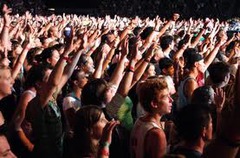
informational social influence

answer
def: influence resulting from one's willingness to accept others' opinions about reality NOT IN PLOTNIK ex: if you don't know anything about basketball, but go to a game, you will simply follow along with those around you (cheer, boo, stand, sit, etc.)
question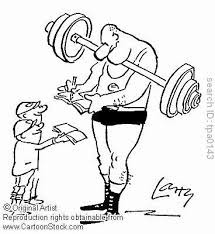
social facilitation

answer
def: stronger responses on simple or well-learned tasks in the presence of others ex: perform better athletically when there is a big crowd
question
social loafing

answer
def: the tendency for people in a group to exert less effort when pooling their efforts toward attaining a common goal than when individually accountable NOT IN PLOTNIK ex: group projects
question
deindividuation

answer
def: the loss of self-awareness and self-restraint occurring in group situations that foster arousal and anonymity ex: soldiers killing during wartime
question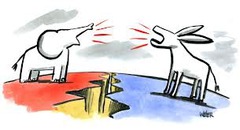
group polarization

answer
def: the enhancement of a group's prevailing inclinations through discussion within the group ex: group is against an idea, then listens to another opinions, and the group as a whole changes its opinion to the topic
question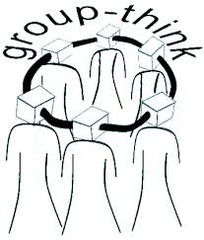
group think

answer
def: the mode of thinking that occurs when the desire for harmony in a decision-making group overrides a realistic appraisal of alternatives ex: mass suicides, Bay of Pigs, riots
question
culture

answer
def: the enduring behaviors, ideas, attitudes, values, and traditions shared by a group of people and transmitted from one generation to the next ex: in relation to America, people in Europe have less personal space
question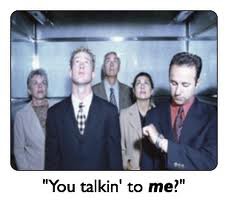
norm

answer
def: an understood rule for accepted and expected behavior. Norms prescribe "proper" behavior ex: Muslim women wear hijabs/other veils
question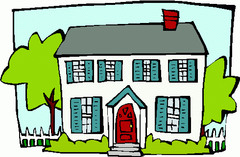
personal space

answer
def: the physical space around our bodies that we like to keep free NOT IN PLOTNIK ex: in the US, the average radius of intimate space is 1.5 feet
question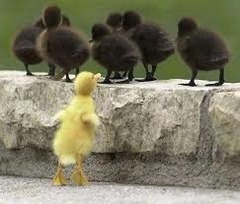
prejudice

answer
def: an unjustifiable (and usually negative) attitude toward a group and its members. Prejudice generally involves stereotyped beliefs, negative feelings, and a predisposition to discriminatory action ex: a person believes that people from Bali are less intelligent than those from Nepal
question
stereotype

answer
def: a generalized (sometimes accurate but often overgeneralized) belief about a group of people ex: Asian people are smarter than white people.
question
discrimination

answer
def: unjustifiable negative behavior toward a group and its members ex: against African Americans in 20th century
question
ingroup

answer
def: "Us"- people with whom we share a common identity ex: team you support
question
outgroup

answer
def: "Them"- those perceived as different or apart from our ingroup ex: rival team
question
ingroup bias

answer
def: the tendency to favor our own group ex: think your team is better than the other
question
scapegoat theory

answer
def: the theory that prejudice offers an outlet for anger by providing someone to blame NOT IN PLOTNIK ex: Germans used Jews as scapegoats for all their countries problems
question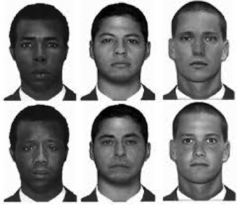
other-race effect

answer
def: the tendency to recall faces of one's own race more accurately than faces of other races. Also called the cross-race effect and the own-race bias ex: white person more likely to recognize other white people's faces
question
just-world phenomenon
answer
def: the tendency for people to believe the world is just and that people therefore get what they deserve and deserve what they get NOT IN PLOTNIK ex: you get a good grade on a test because you are a good person. A different person gets a bad grade because they are a bad person.
question
aggression

answer
def: any physical or verbal behavior intended to hurt or destroy ex: bullying
question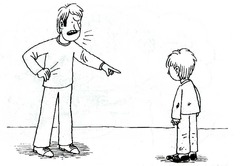
frustration-aggression hypothesis

answer
def: the principle that frustration - the blocking or an attempt to achieve some goal- creates anger, which can generate aggression ex: person becomes frustrated with job then becomes aggressive at home to redirect frustration
question
mere exposure effect

answer
def: the phenomenon that repeated exposure to novel stimuli increases liking of them NOT IN PLOTNIK ex: see an advertisement for a product so many times you grow to like that product
question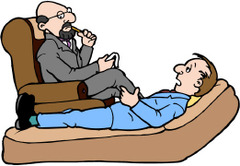
self-disclosure

answer
def: revealing intimate aspects of oneself to others ex: telling a counselor personal information so they can help you
question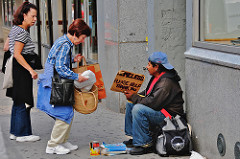
altruism

answer
def: unselfish regard for the welfare of others ex: volunteer at nursing home, give money to those in need
question
bystander effect
answer
def: the tendency for any given bystander to be less likely to give aid if other bystanders are present ex: see a car wrecked on the side of the road but don't stop because you think someone else will
question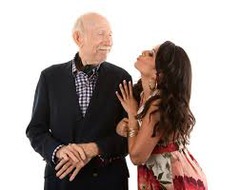
social exchange theory

answer
def: the theory that our social behavior is an exchange process, the aim of which is to maximize benefits and minimize costs ex: when the costs begin to outweigh the benefits in a relationship, one will often leave the relationship
question
reciprocity norm
answer
def: an expectation that people will help, not hurt, those who have helped them NOT IN PLOTNIK ex: if a person gets a gift for their birthday, they are more likely to give a gift to the other person on their birthday
question
social-responsibility norm
answer
def: an expectation that people will help those dependent upon them NOT IN PLOTNIK ex: help those affected by flooding
question
conflict

answer
def: a perceived incompatibility of actions, goals, or ideas ex: WWII
question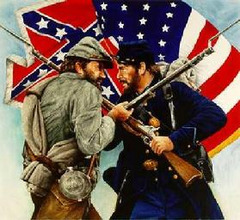
mirror-image perceptions

answer
def: mutual views often held by conflicting people, as when each side sees itself as ethical and peaceful and views the other side as evil and aggressive NOT IN PLOTNIK ex: US thought they were right in WWII, but so did Germany
question
GRIT

answer
def: Graduated and Reciprocated initiatives in Tension-Reduction- a strategy designed to decrease international tensions NOT in PLOTKNI Careful: We said you have "grit" if you work hard and persevere so this is a different use ex: work to decrease tensions between North Korea and South Korea
question
Door in the face phenomenon
answer
You make a large request first and when told "no," you make a smaller request NOT IN PLOTNIK
question
Low ball
answer
In sales, they offer you a set price that you agree on, and then, before the final contract is signed or payment is made, they raise the price; the idea being that once you have made a commitment to take the product, you will stick with your commitment (car dealers do this by adding on fees...don't pay additional fees!)
question
attributions
answer
things we point to as the cause of events, other people's behaviors, and our own actions
question
internal attributions
answer
explanations of behavior based on internal characteristics or dispositions
question
external attributions
answer
explanations of behavior based on the external circumstances or situations
question
self-serving bias
answer
we tend to explain our own successes by attributing them to our dispositions (internal) and we attribute our failures to the situation; also, we tend to see our good qualities and believe we are right
question
Attitudes have 3 components
answer
cognitive (thought); affective (emotion); behavior
question
Counterattitudinal Behavior
answer
taking a public position that runs counter to your beliefs
question
obedience
answer
performing a behavior because of a direct order from an authority figure
question
altruism
answer
form of helping, perhaps with risk/cost, for the benefit of others with no expectation of a reward
question
Prosocial behavior
answer
Helping
question
Antisocial behavior
answer
Behavior that is hurtful
question
Compliance
answer
a type of conformity in which we go along but we don't change our personal beliefs
question
Social inhibition
answer
decrease in performance in the presence of a crowd
question
Deindividuation
answer
performing an irrational behavior due to the anonymity we feel when in a crowd
question
Bystander effect
answer
the presence of others may inhibit us from taking action (could be due to diffusion of responsibility or "Informational influence" in which no one else is responding so we judge that help is not needed



